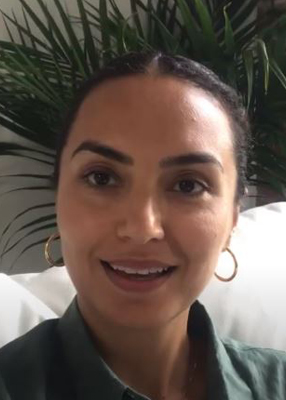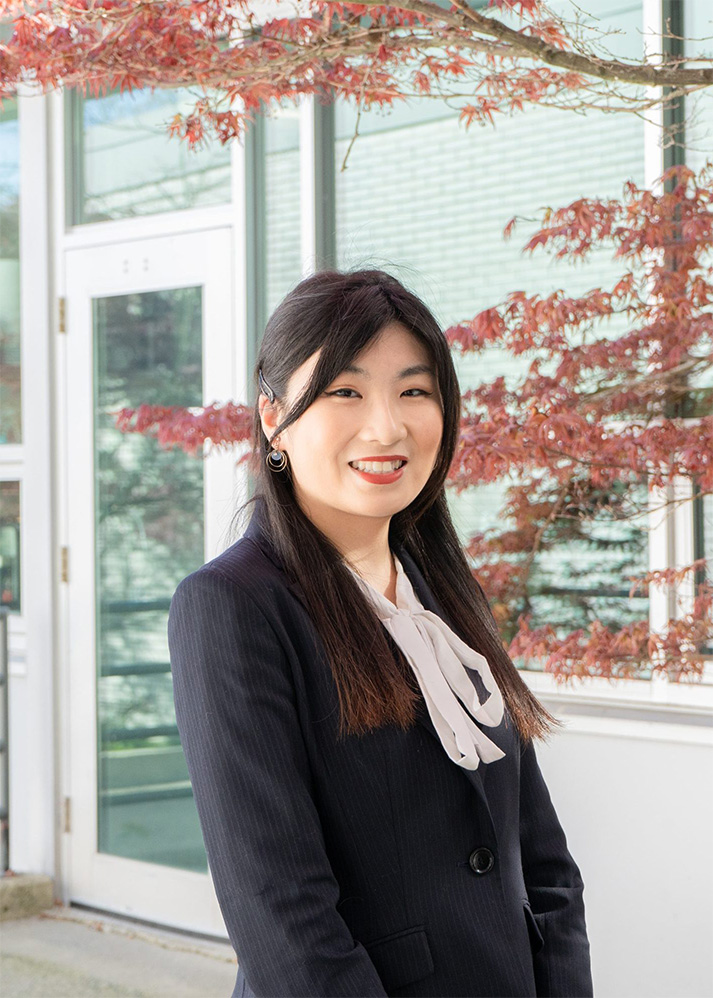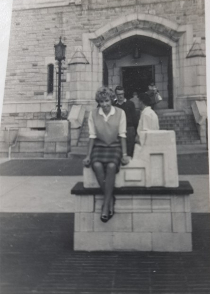Azar Eskandarpour

Azar Eskandarpour joined the Arts Co-op program by fluke. After accidently learning about the program in an orientation, she realized that co-op was the right program for her. Through Arts Co-op, Azar was able to experience a variety of job opportunities to help grow her professional experience. She explains that co-op is what allowed her to eliminate possible career paths, guiding her towards becoming a humanitarian worker.
In this interview, Azar offers advice to current or prospective Arts Co-op students, encouraging them to take advantage of the experiences and growth that the program can provide.
What was your favourite co-op term and why?
The first term was at the Recycling Council of BC, a crown corporation and I was able to work there for some time. Then I moved on to CTV News as a diversity researcher, which was really interesting – at the time, I was thinking of going into journalism. Then the next job I had was in Ottawa, over the summer, working at the Canadian International Development Agency. And finally, my last co-op posting was in Brussels at the Canadian Mission to the EU, when I was exploring the idea of going into the diplomatic corps.
How did the Arts Co-op Program prepare you for your current career?
The most useful thing for me was to be able to see the real-life work environment. As a student, we tend to glamorize what jobs we want and what that is going to look like. What co-op allowed me to do was observe and see some of the more senior staff around, whether it’s a diplomat, journalism or in various fields; it narrowed down what I wanted.
Arts Co-op helped me to eliminate options and ultimately led me to understand that what I wanted was more hands-on with more field exposure; I really wanted to be part of the action.
What advice do you have for current or incoming co-op students?
First of all, stay in the program. It’s a great program to be part of, and taking more time during your degree gives you the time to reflect and think about what you really want to do. Take this opportunity to try on different careers, to try on different work environments, and to really see what fits or doesn’t fit. Ultimately, co-op will give you more answers than if you had just spent your bachelor’s degree going from class to class.
What is a lesson from one of your work terms that you carried with you into your career?
What I learned repeatedly from my postings was that the job titles and fields I was interested in and applied for did not translate into what I held in my imagination as a student. For example, while sitting on diplomatic negotiations between Canada and the EU, I realized it mainly consisted of a back and forth between lawyers. And lawyering, unlike what I saw on television, was mainly working on contracts and reviewing documents. It left me scratching my head and realizing that instead of “professions” or “titles”, I needed to find work that matched my values and the issues I cared about. Most importantly, I started looking at how I wanted to design my life, spend my day to day, what work culture, pace, and exposure I wanted from life and the impact I wanted to make.
What are some things that co-op students can do to make the most of their co-op experience?
Try to build authentic relationships at work and maintain them beyond the posting. Try to meet as many people as possible for coffee or lunch and inform yourself about their own career paths, choices and advice. Dare to find your own out of the box coop work placement if you have a particular dream organization or company in mind. I didn’t know it at the time, but being a student sometimes allows you to engage and offer co-op opportunities to an employer who might not have thought or known to engage with UBC arts co op when needing short term hires.
Azar Eskandarpour



Azar Eskandarpour joined the Arts Co-op program by fluke. After accidently learning about the program in an orientation, she realized that co-op was the right program for her. Through Arts Co-op, Azar was able to experience a variety of job opportunities to help grow her professional experience. She explains that co-op is what allowed her to eliminate possible career paths, guiding her towards becoming a humanitarian worker.
In this interview, Azar offers advice to current or prospective Arts Co-op students, encouraging them to take advantage of the experiences and growth that the program can provide.
What was your favourite co-op term and why?
The first term was at the Recycling Council of BC, a crown corporation and I was able to work there for some time. Then I moved on to CTV News as a diversity researcher, which was really interesting – at the time, I was thinking of going into journalism. Then the next job I had was in Ottawa, over the summer, working at the Canadian International Development Agency. And finally, my last co-op posting was in Brussels at the Canadian Mission to the EU, when I was exploring the idea of going into the diplomatic corps.
How did the Arts Co-op Program prepare you for your current career?
The most useful thing for me was to be able to see the real-life work environment. As a student, we tend to glamorize what jobs we want and what that is going to look like. What co-op allowed me to do was observe and see some of the more senior staff around, whether it’s a diplomat, journalism or in various fields; it narrowed down what I wanted.
Arts Co-op helped me to eliminate options and ultimately led me to understand that what I wanted was more hands-on with more field exposure; I really wanted to be part of the action.
What advice do you have for current or incoming co-op students?
First of all, stay in the program. It’s a great program to be part of, and taking more time during your degree gives you the time to reflect and think about what you really want to do. Take this opportunity to try on different careers, to try on different work environments, and to really see what fits or doesn’t fit. Ultimately, co-op will give you more answers than if you had just spent your bachelor’s degree going from class to class.
What is a lesson from one of your work terms that you carried with you into your career?
What I learned repeatedly from my postings was that the job titles and fields I was interested in and applied for did not translate into what I held in my imagination as a student. For example, while sitting on diplomatic negotiations between Canada and the EU, I realized it mainly consisted of a back and forth between lawyers. And lawyering, unlike what I saw on television, was mainly working on contracts and reviewing documents. It left me scratching my head and realizing that instead of “professions” or “titles”, I needed to find work that matched my values and the issues I cared about. Most importantly, I started looking at how I wanted to design my life, spend my day to day, what work culture, pace, and exposure I wanted from life and the impact I wanted to make.
What are some things that co-op students can do to make the most of their co-op experience?
Try to build authentic relationships at work and maintain them beyond the posting. Try to meet as many people as possible for coffee or lunch and inform yourself about their own career paths, choices and advice. Dare to find your own out of the box coop work placement if you have a particular dream organization or company in mind. I didn’t know it at the time, but being a student sometimes allows you to engage and offer co-op opportunities to an employer who might not have thought or known to engage with UBC arts co op when needing short term hires.



